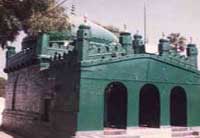 |
Hazrath's Shrine (Dargah) at Kazipet which is known as Kazipet Dargah is 2 km from Kazipet Railway Station in Warangal District, which is famous world wide.People come from all parts of the world and from all religions to attend ursu every year.It seems there are only 3 durgahs (Madina, Baghdad,Kazipet) like this in the entire world. |
|
The sufi-saint Hazrath Afzal Biabani (R.A.) attempted to remove the barriers of caste, creed, language, religion and region and provided a broad opportunity to make available to the local milieu a get-together. He was Qazi of Warangal district and Jagirdar (Land- Lord of Kazipet village). But he was averse to the life of a feudal Lord and never wanted to live in the Haveli (a village oalace). He preferred to live in a hut like any other poor man. His mother objected to it she was of the opinion that he had to maintain the dignity of his social position as a Qazi and Jagirdar. He politely convinced her and made the way clear to reside in a hut, this change delineated other changes in various aspects of his life apparently breaking the barriers between the life of the master and a servant. He willingly opted for the dress, the food and life style of a poor man. Haji Mohibullah Khan Saheb from delhi and Namdar Khan Saheb, a servant in the army at Bolaram in Secunderabad, wished to join the circle of Hazrath Afzal Biabani (R.A.) as a disciples. When they went to his hut at Kazipet, they were informed that he was in the hut of a Hindu weaver (Padmashali) who was his immediate neighbour and friend, when they found the great sufi resting his head on a stone and sleeping on ground. The eagerness of the sufi-saint to live closer to the hearts of the people shows nothing except his willingness to share their joys and sorrows as members of one family and thus strengthen the integrated setting of the society. Some members of the army contingent stationed at Hanamkonda waited upon the Qazi Saheb Hazrath Afzal Biabani (R.A.) and requested him to lead them in Eid prayer at Hanamkonda. They brought a horse for his ride. He asked for two more horses for his friends. People were taken aback to see that those friends were the Hindu weavers riding along with Hazrath. He wanted to share the joys of Eid with his Hindu neighbours. The Historian like Henry George Briggs, Azam Jung, Chirag Ali and Syed Hussaini Bilgrami, all agreed that the 18th and 19th centuries witnessed the administration of the state of Hyderabad at its descent watershed , for the purpose of collection of land revenue territories were framed out and assigned to contracts called sahukars. They exercised all manners of coercion to collect the revenue from cultivators. The member of the collection staff had to be fed by the villagers and forced-labourer were engaged to help the tax collectors. Obviously enough the worst hit in this gruelling situation were the poor of the village community. Practically there was no relief available to them through administrative channel. Happily, indeed, Hazrath Afzal Biabani (R.A.) appeared oh the scene. He had his style of experimenting his own way of life which enabled him to attempt to ward off the human malady, facing the community at his grass roots and his stake was no doubt a great success. Hazrath Afzal Biabani (R.A.) used to teach his disciples high morals like simplicity, social equality and to serve people irrespective of their caste, creed, language, religion and region. For this reason lacs of people belonging to different religions are devotees and followers. Thus he proved himself to be a symbol of national integration, communal harmony, social justice and protector of human rights. Even today, Hazrath's Shrine (Dargah) at Kazipet is much thronged and revered by Muslims, Hindus, Christians and Sikhs alike. It is observed that most of the Hindu families of Kazipet and neighbouring villages bring the bride and bride-groom to this holy shrine (Dargah) immediately after the marriage to get the blessings for the newly married couple before they get to their homes. For more information go to http://www.afzalbiabani.org/. |
|